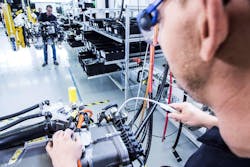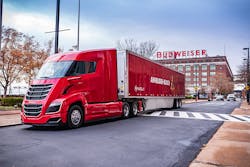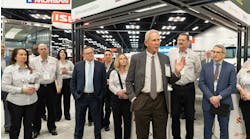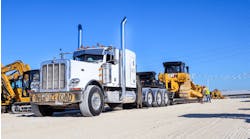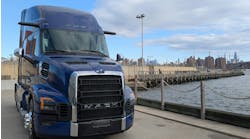Many see climate change as the biggest existential threat to not just people, but many other inhabitants of the Earth. Martin Lundstedt, the president and CEO of Volvo Group, considers climate change and the need to reduce humanity’s carbon footprint “the number one issue.”
Globally, transportation accounts for around 25% of CO2 emissions.
“We need to drive sustainable transportation to the next level,” Lundstedt said, adding that saving the planet is a “massive undertaking” that “no one can do on their own.”
Lundstedt, who has 30 years of experience in the world’s largest contributor to greenhouse gasses, has recently made a preliminary non-binding agreement with long-time competitor Daimler Trucks to co-develop fuel cell technology, which converts hydrogen into electricity and is believed to someday power long-haul trucking’s zero-emission future.
The 50/50 joint venture consolidates all the work Daimler Truck has put toward fuel cells over the last quarter-century, including the consumer-centric unit Mercedes-Benz Fuel Cell GmbH, which has yielded hundreds of fuel cell-powered test cars. Volvo Group is putting forth €600 million on a cash and debt-free basis.
“Partnership is the new leadership,” Lundstedt said.
“Together we can focus so much faster,” said Daimler Chairman Martin Daum, who also has 30 years in the industry. He called the announcement “one of the highlights of [his] career” and a “historic day for trucking.”
He also noted this effort isn’t “starting from scratch,” but instead “building on a reliable and mature foundation.”
Hydrogen has long been sought after as a fuel source, for its abundance and energy density. The system weighs less than a battery-electric system and provides enhanced range. Battery-electric trucks are currently in the 100-200 mile range with sights set on 400, while fuel cell electric truck may surpass 600 miles per tank. Charging a battery electric truck could takes hours, while their hydrogen counterparts would be about 15 minutes. For regional haul, that electric charging can be done at the home base after the shift, but for long haul, that puts a serious dent into overall productivity.
“Fuel cells have always been 10 years away since the beginning of the 90s,” Lundstedt said. “For the first time in my career, it’s sooner than 10 years away.”
The issue has been processing the hydrogen into a storable medium. It takes an incredible amount of energy to turn it into liquid hydrogen, delivered by tanker, or compressed gas, produced at the fueling station from water. And if the electricity generated to process the hydrogen does not come from a renewable source, it’s not truly a zero-emissions technology. Using natural gas plants using carbon capture technology would be one way to make the method carbon neutral.
With this partnership, those power generation and infrastructure questions will undoubtedly be addressed. Daum said in this area governments can help take some of the financial burden initially, but subsidies “are never a good solution.”
He said there has to be a clear economic case for fleets to adopt fuel cell enabling technologies (FCETs), which must deliver the same performance in terms of durability, torque, strength and efficiency as diesel.
The ultimate goal is to fulfill the 2050 Paris Agreement net-zero emissions target. Lundstedt believes that trucks, which have about a 10-year lifespan, need to reform by 2040 “to avoid the warming of the planet.”
With two of the world’s leading truck makers on the task, there is reason for optimism.
The first test FCETs could hit the road by the middle of the 2020s in Europe, while Daum sees the mid-2030s as a likely time frame for mass adoption.
“I’m pretty optimistic that 20 years from now this will cover the entire market and 95% of the applications,” Daum said.
A U.S. based truck maker called Nikola Motor Co. (soon to be go public after a recent merger is approved) has plans for the technology to arrive even earlier, with production of hydrogen-powered trucks expected to start in as little as 24 months.
"We think this is great news,” said Nikola CEO and founder Trevor Milton. “For years we have been telling the world that fuel-cells work and have advantages inside heavy-duty applications. To see other OEM's finally come around shows legitimacy to the fuel-cell industry and helps everyone in the fuel-cell world."
This is going to be positive for all parties involved in the industry,” he continued. “We have been spending money and resources educating the market and suppliers regarding fuel-cells. I am confident we will work together with both Daimler and Volvo in supplier relationships to ensure components are compatible to drive costs down. We could not be happier about this announcement, especially since they are helping to validate our business model. What perfect timing for Nikola."


